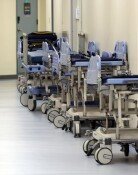Water Quality Test Results Forged
Mr. Kim (age 44), the head of the underground water developing company J, commissioned institute M to examine water quality on August last year in order to develop subterranean water that would be used for drinking water at an agro-fisheries trade center in Gyeonggi Province.
The examination found that the percentage of NO3N in the underground water was 10.8ppm, which is above the allowed standards of 10ppm. NO3N is an element found in underground water when excrements from humans or animals flow into it.
NO3N causes cyanosis (turning human body blue) and anemia and retards development. In Czechoslovakia from 1953 to 1960, nine children died after drinking milk containing upwards of 70ppm of NO3N.
Instead of notifying the results of the study and prohibiting development of underground water, however, Mr. Kim (age 46), the head of the institute M, ordered his employee Mr. Choi (age 28), who is responsible for water quality examinations, to manipulate the result, fearing frequent inadequate water quality results would mean less commissions for quality investigations, which would in turn hurt operation of his business.
At present, there are 52 water quality examination institutions in Korea: 27 private and 25 public. They are waging fierce competition to attract commissions for examination. Every time they are hired for an examination, they charge 250 to 280 thousand won.
Choi fabricated the result of the study to 9.7ppm, which is below the allowed limit. The company J issued a false report to a government official, and received permission to develop and use underground water.
The prosecution has recently caught water quality examination institutes who forged the result of their inspection, underground water developers, and related government officials.
The 2nd Criminal Department of Seoul District Prosecutors Office (headed by Kim Jong-ro) announced yesterday that after it started a crackdown on the industry alongside the Ministry of Environment (MOE) since October this year, it nabbed 37 persons, including eight from a water quality inspection center, 18 underground water developers and four government officials on charges of violation of underground water act. Five among them including heads of the company J and institute M were arrested and indicted.
Out of 1,753 locations whose underground water quality results were found to have been manipulated, 1,410 had water branded fit to drink, meaning people using the water in the regions have drunk polluted water. The investigation of the prosecutors found that some of the drinking water contained NO3N up to 17 times more than the standards of 10ppm. Among the rest 343 locations, water in 191 places was for living, 148 for agricultural use and four for industrial use.
Four hundred eighty nine households, 286 community waterworks, 168 schools, multi-use facilities like accommodations, 19 daycare centers and 315 others including restaurants have used underground water for drinking. By region, it was 57 places in Seoul, 570 in Gyeonggi Province, 700 in Chungcheong Province and 83 in others. After the revelation of the results, the MOE banned the use of underground water that has been found polluted.
An extremely cutthroat competition is underway among water quality examination centers and the management by the monitoring authorities has been insufficient, a source from the prosecution pointed out. We need to ask for stricter qualifications when choosing examination institutions and conduct regular check-ups more frequently from the current every three years to every year.
Meanwhile, according to the prosecution and the MOE, their analysis of original manufactured water and product water for sale of 62 spring water manufacturers nationwide showed 11 original water and one product water manufacturers had been making water inadequate for drinking. Prosecutors and the ministry said they ordered the 12 manufacturers to halt drawing underground water and to recall their products on the market.
As for the mass food poisoning incident in the Seoul Metropolitan area this June, the prosecution indicted Mr. Seong (age 46) and others without physical restraint on charges of providing vegetables that were washed with polluted underground water to the affected schools. However, CJ Food System, the meal provider, was not prosecuted as it was not found the company intentionally used polluted ingredients.
will71@donga.com







